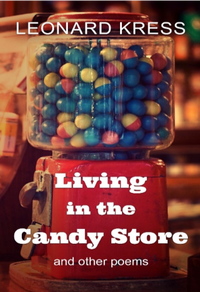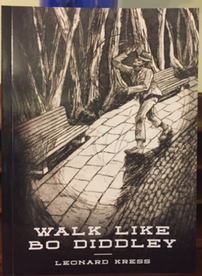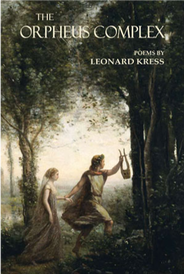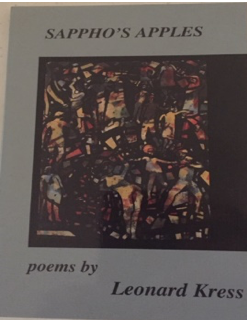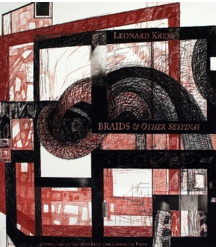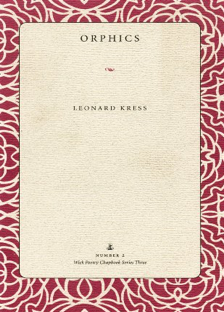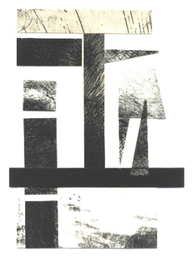|
Craniotomy Sestinas
“Easy to think a collection of twenty sestinas (minus envoi) would be drear, repetitive, self-indulgent. But read these poems, and something happens. Call it surprise, call it the poet letting the poem loose to fly and going along on the tailwind. The poet pays homage to other artists, explores myth and the great biblical themes, writes of love and grief. At times the form becomes nearly invisible as the voice takes over. There’s a rollicking cleverness that turns away from itself into the deeper/darker heart of its concerns, as in the final poem where a son grieving for his dying mother says ‘Strange for us offspring–parents retracting into kids,/ Meeting ours along the way, flashing signs.’ I find these poems challenging, compelling, and moving in both muscular and emotional ways.” —Betsy Sholl Kelsay Books Https://Kelsaybooks.com/Products/Craniotomy-Sestinas |
Living in the Candy StoreFrom the early interweave of working-class life and intellectual and cultural erudition in poems such as “Letter from Bernard Malamud,” “Surplus Jeep,” and “Elmo,” through a glimpse of Polish women tending the graves in Gryzantyny, all the way to the hypnotic and heart-breaking “Ginsburg’s Harmonium,” Leonard Kress provides a feast of compressed, intelligent writing presented with highly polished craft — personal narratives full of colorful observations and surprising insights as well as touches of humor. The past is not even the past; whether it’s the Cold War or the Iliad, Kress makes it provocatively modern and alive —Oriana Ivy, author of April Snow (2011 New Women’s Voices Prize Winner), and From the New World
An army surplus jeep whose ride is as “choppy” as the final movement of Shostakovich’s 6th symphony? A memory of driving deep in Pennsylvania coal country to woo a girl whose miner father groaned “black piss” at the urinal, while the polka-dancing daughter would “sweat herself slippery, too slick to hold on to, changing her outfit, her partner with each set”? Getting a letter from Bernard Malamud, or reading Isaac Babel’s The Red Calvary alongside a co-worker perpetually hung-over from Mad Dog 20/20? Or, how about a poem titled “Notes for a Poem: The Liquidation of History,” one of the best long-poems I have ever encountered, tracing a forced march through the kaleidoscopic landscape of 20th century Poland, equal parts intelligentsia, alcohol, and ethnic complexity? —Daniel Bourne, author of Where No One Spoke the Language and The Household Gods, editor of Artful Dodge Encircle Publications, 2018 |
Walk Like Bo DiddleyDon't be lulled by the familiarity of the classic Bob Dylan quote titling this collection, for Leonard Kress pulls with intelligent reach and grasp from all sectors of intellectual history, myth and culture in shaping the tightly composed, 13-line poems that comprise his latest collection. Religious violence from arcane lore, Vedic mythos, Odysseus "compressing decades into single strophes," "love" measured as barometric pressure, "callithumpian celebrants," a red-tailed hawk spiraling over Ohio Route 795, in Kress's poems we range across realms of imagination and deep history. Marvelously intelligent without any stodginess of idea or spirit, they're tightly written, inventively formal, and great fun to read. 5 Stars for WALK LIKE BO DIDDLEY. A fine, fine collection.
—Joel Lipman Black Swamp Poetry Press (blackswamppoety@gmail.com) |
The Orpheus ComplexThe Orpheus Complex…an ambitious sonnet sequence that combines the myth of Orpheus with the poet's reflections on various other issues including the state of spirituality in America today, the problem of "translating" an ancient myth into a contemporary context, and the nature of poetry and its relationship to what poets are writing. Poetry at the start of the twenty-first century has become familiar, comfortable, safe….The author of The Orpheus Complex seems to declare, "I've enough of that." He asks us instead to imagine Orpheus, the ancient poet, sprung loose in America and writing intricate, rhymed sonnets that look at the world as it is and as it has been imagined by the poets who have come after him. The wonder of this book is that these poems don't seem academic, simply a Modernist or Postmodernist exercise in literary self-consciousness. Rather, what stands out in The Orpheus Complex are the author's erudition and considerable craft combined with his own life concerns. The mix results in poems that are always surprising, knowing, and effecting. —John Guzlowski, author of Lightning and Ashes
"Imagine a postmodern Pindar with a liberal arts education and good command of Polish; think of an Orpheus who starts out as a horny kid from the American suburbs, hits the road like Kerouac, learns a few things along the way, but still looks back--wacked! Kress has come up with some playful and surprisingly haunting sonnets that glance at the old stories but sing their own new, not too sweet songs." —Julia Kasdorf Main Street Rag Bookstore |
Sappho's Apples"The title poem of this volume illustrates the best of the poet’s work, Sappho’s Apples is tightly written, highly allusive, never obscure, and told in a fascinating, ruminative voice. The associative thoughts of the speaker at first seem only randomly connected, but ultimately they illuminate the central situation: the ambiguous violence occurring on the other side of the speaker’s apartment wall….This poem, like so many in Kress’s book is about making meaning when you don’t have enough information, like “shards of a misplaced play”….That Kress would want both the form to be right and the voice to be true, in spite of evidence of a rotten world, shows that his skepticism is not an ideological prejudice, but a mode of inquiry…..” —Jayme Stayer, Cold Mountain Review
Available on Amazon |
Braids & Other SestinasNumber 7 in the Keystone Chapbook Series and co-winner of the 2010 Keystone Chapbook Prize
"Easy to think a collection of twenty sestinas (minus envoy) would be drear, repetitive, self-indulgent. But read these poems, and something happens. Call it surprise, call it the poet letting the poem loose to fly and going along on the tailwind. The poet pays homage to other artists, explores myth and the great biblical themes, writes of love and grief. At times the form becomes nearly invisible as the voice takes over. There’s a rollicking cleverness that turns away from itself into the deeper/darker heart of its concerns, as in the final poem where a son grieving for his dying mother says ‘Strange for us offspring–parents retracting into kids,/ Meeting ours along the way, flashing signs.’ I find these poems challenging, compelling, and moving in both muscular and emotional ways.” —Betsy Sholl Seven Kitchen Press |
Orphics2003: Winner of the Kent State Chapbook Award
“Imagine a postmodern Pindar with a liberal arts education and good command of Polish; think of an Orpheus who starts out as a horny kid from the American suburbs, hits the road like Kerouac, learns a few things along the way, but still looks back—wacked! Kress has come up with some playful and surprisingly haunting sonnets that glance at the old stories but sing their own new, not too sweet songs.” –Julia Kasdorf Available on Amazon |
Thirteens (with illustrations by Mania Dajnak) |
The Centralia Mine Fire
1987 (out of print, available online)

